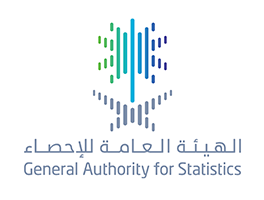
GASTAT adopts chain-linked methodology in calculating real GDP of the Kingdom
Based on its role in developing the statistical sector, the General Authority for Statistics adopted the chain-linked methodology in the national accounts to calculate the real GDP. The publication of Q4, 2023 and the annual publication of the same year will be published using the new methodology instead of the previous methodology that was based on utilizing the fixed base year.
Saudi Arabia is the first country in the Gulf and Arab regions and among the first G20 countries that implement the chain-linked methodology. This dynamic methodology is thought to be a useful tool for estimating the real growth rates of national accounts and for measuring economic growth rates using weights and prices from the prior year as a benchmark to provide measurements within adjacent time periods. It accurately reflects the current economic conditions of any country that employs it.
Expert statisticians in the field of national accounts have pointed out that the chain-linked methodology takes into account the impact of price changes, flexibility in dealing with economic activities along with their continuous updating and accurately reflects economic changes. It also considers production structure and consumption patterns, allowing for clearer international comparisons. International statistical organizations and bodies concerned with national accounts systems urge countries worldwide to adopt the chain-linked methodology instead of the previous methodology that used a fixed base year for weights and prices, in order to accurately reflect real growth at the national level and monitor developments and achievements effectively.
It is worth mentioning that the Gross Domestic Product publication is one of the releases issued by the General Authority for Statistics on a quarterly and annual basis to provide estimates of the GDP for the relevant period, expenditure components, measure the contribution of economic activities and various regulatory sectors, as well as provide modern annual economic indicators such as GDP growth rates, relative contributions of economic activities, and regulatory sectors to the GDP according to the latest international systems. It also includes many analytical tables highlighting the tracks of the national economy.
National accounts publications also contribute to meeting the requirements of the Kingdom Vision 2030, regional requirements to understand the national economy, including the statistical center of the Gulf Cooperation Council, the Arab Monetary Fund, the League of Arab States, in addition to international requirements such as those of the World Bank, the International Monetary Fund, the Organization for Economic Cooperation and Development, and others. The General Authority for Statistics website provides more details about its statistical products.
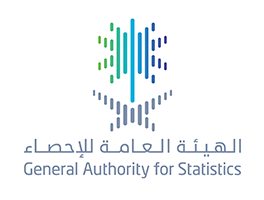
GASTAT participates in the meeting of the Permanent Technical Committee for Statistics
The Permanent Technical Committee for Statistics of the Arab League held its forty-ninth meeting in Cairo on September 26-27 of this year at the headquarters of the General Secretariat of the Arab League. The meeting was attended by delegations representing official Arab statistical agencies, as well as a number of specialized Arab organizations in the field of statistics. The delegation of Saudi Arabia was led by Dr. Fahad bin Abdullah Al-Dossari, President of the General Authority for Statistics.
During the sessions, various technical and administrative topics were discussed, including monitoring the implementation of recommendations from the previous committee meeting, highlighting statistical activities carried out by Arab official statistical agencies in the past period, as well as reports and recommendations from subcommittees.
It is worth mentioning that the Permanent Technical Committee for Statistics aims to enhance Arab statistical capabilities, exchange experiences, information, and technical advice among member countries, and provide the necessary statistical data and indicators to serve the common Arab statistical work.
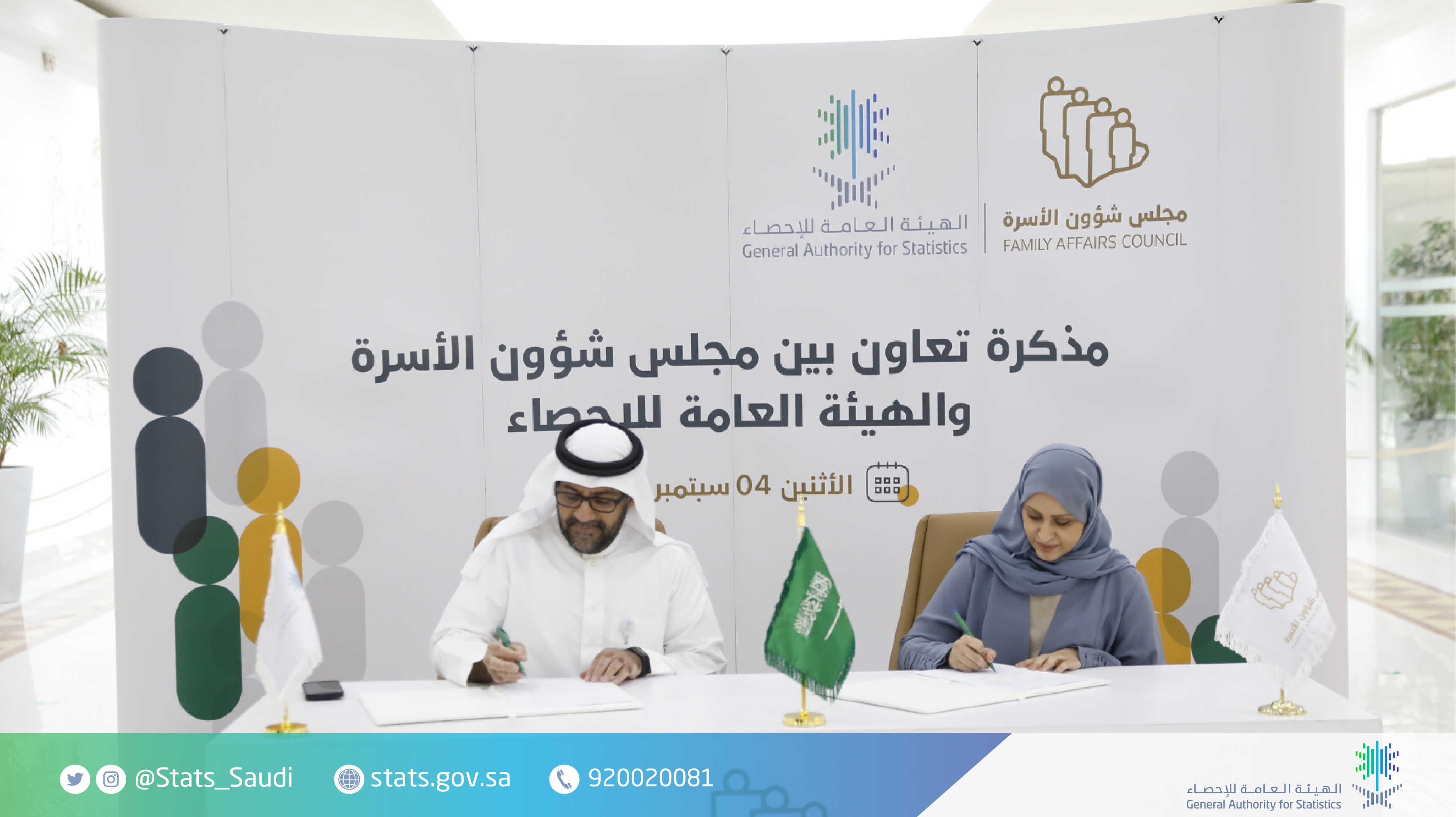
GASTAT and Family Affairs Council sign Memorandum of Cooperation
The General Authority for Statistics and the Family Affairs Council signed a memorandum of cooperation yesterday, Monday September 4, 2023. The memorandum aims to enhance integration between the two entities in their respective fields of expertise, establish a general framework for joint activities and tasks, and develop their institutional capacities to serve common interests and goals. The memorandum was signed at the headquarters of the Family Affairs Council in Riyadh. Dr. Fahad Al-Dossari, President of the General Authority for Statistics, signed on behalf of the authority, while Dr. Maimouna bint Khalil Al-Khalil, Secretary-General of the Family Affairs Council, signed on behalf of the council.
The memorandum highlights the exchange of information and data between the two parties - each according to its expertise - in areas of mutual interest, cooperation in issuing statistical publications related to families, exchanging support and technical and knowledge expertise in areas of mutual interest, as well as exchanging advice in the areas of expertise of each party. This includes exchanging research and studies, publications, and making it possible for the staff of both parties to participate in training courses, seminars, scientific conferences, and workshops related to the areas of mutual cooperation agreed upon.
GASTAT completes the project of Transition to Accrual Accounting
The team of the project of transition to accrual accounting was recognized by Dr. Fahad bin Abdullah Al-Dossari, President of the General Authority for Statistics, for meeting the project's requirements and completing its main phases. This helped GASTAT to transit to the accrual accounting principles and be involved in the release of the first national unified financial center.
It is worth mentioning that the transition to accrual accounting and the adoption of international accounting standards in the public sector are initiatives stemming from the National Transformation Program, which is adopted by the Ministry of Finance through its agency for financial and accounting affairs. The project will help provide complete, accurate, and timely information about the financial center, and results of the entities’ activities and cash flows. It will also enhance supervision over revenues, expenses, assets, and liabilities, as well as develop financial departments in government entities and support decision-making processes.
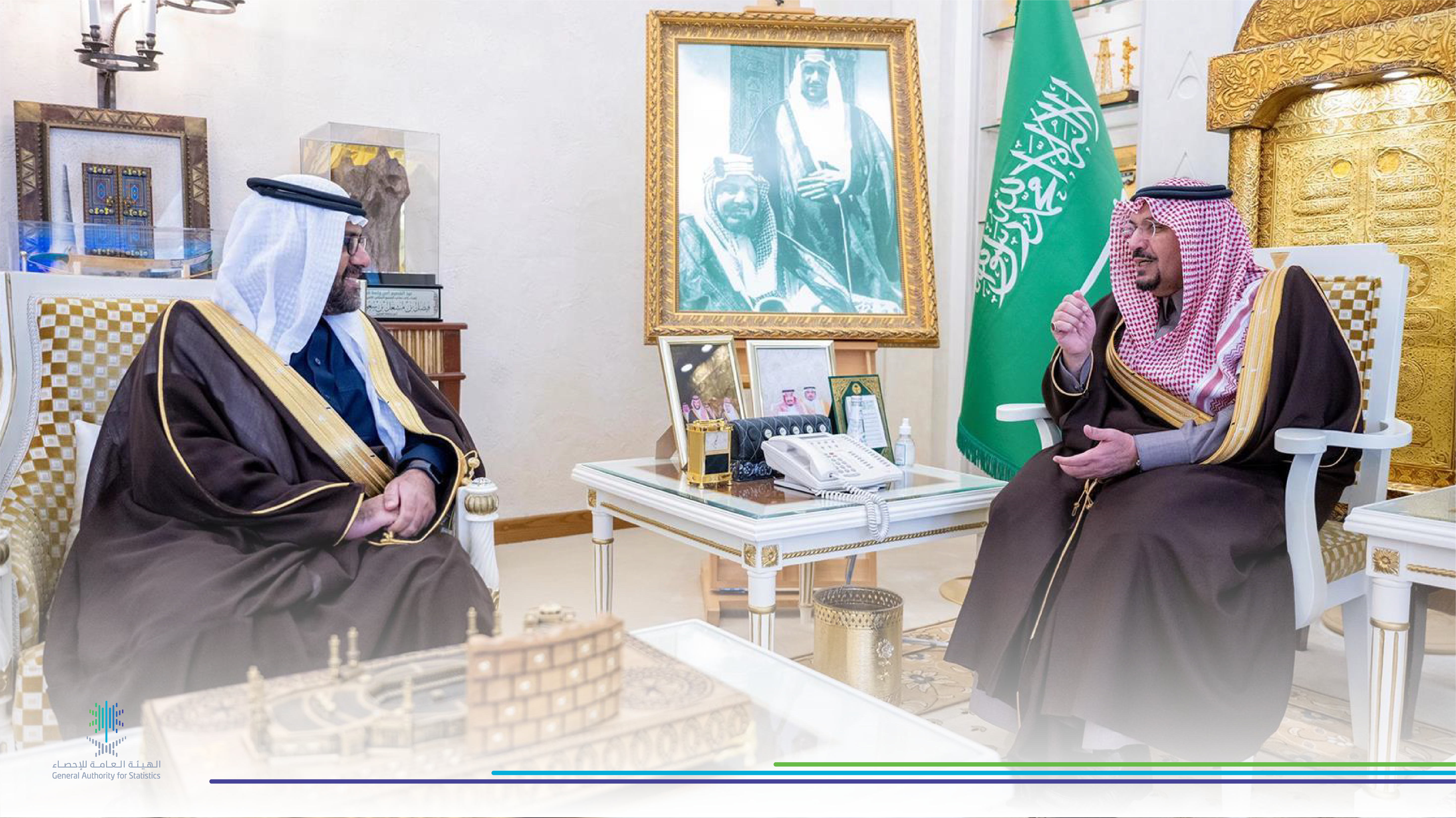
Prince of Qassim region receives GASTAT president
Today, His Royal Highness Prince Dr. Faisal bin Mishal bin Saud bin Abdulaziz, Prince of Qassim Region, received in his office Dr. Fahad Al-Dossari, President of the General Authority for Statistics.
His Royal Highness the Governor of Qassim praised the role played by the General Authority for Statistics as the only official statistical reference for implementing, supervising, and regulating the statistical work in the Kingdom of Saudi Arabia, as it provides statistical products in social, economic, and environmental fields to support policymakers and decision-makers in advancing the implementation of development plans.
The meeting included a review of the results of statistics and reports prepared by GASTAT in collaboration with all government entities and stakeholders in the region, providing accurate and comprehensive statistical data that cover all aspects of social, economic, and environmental dimensions in Qassim region.
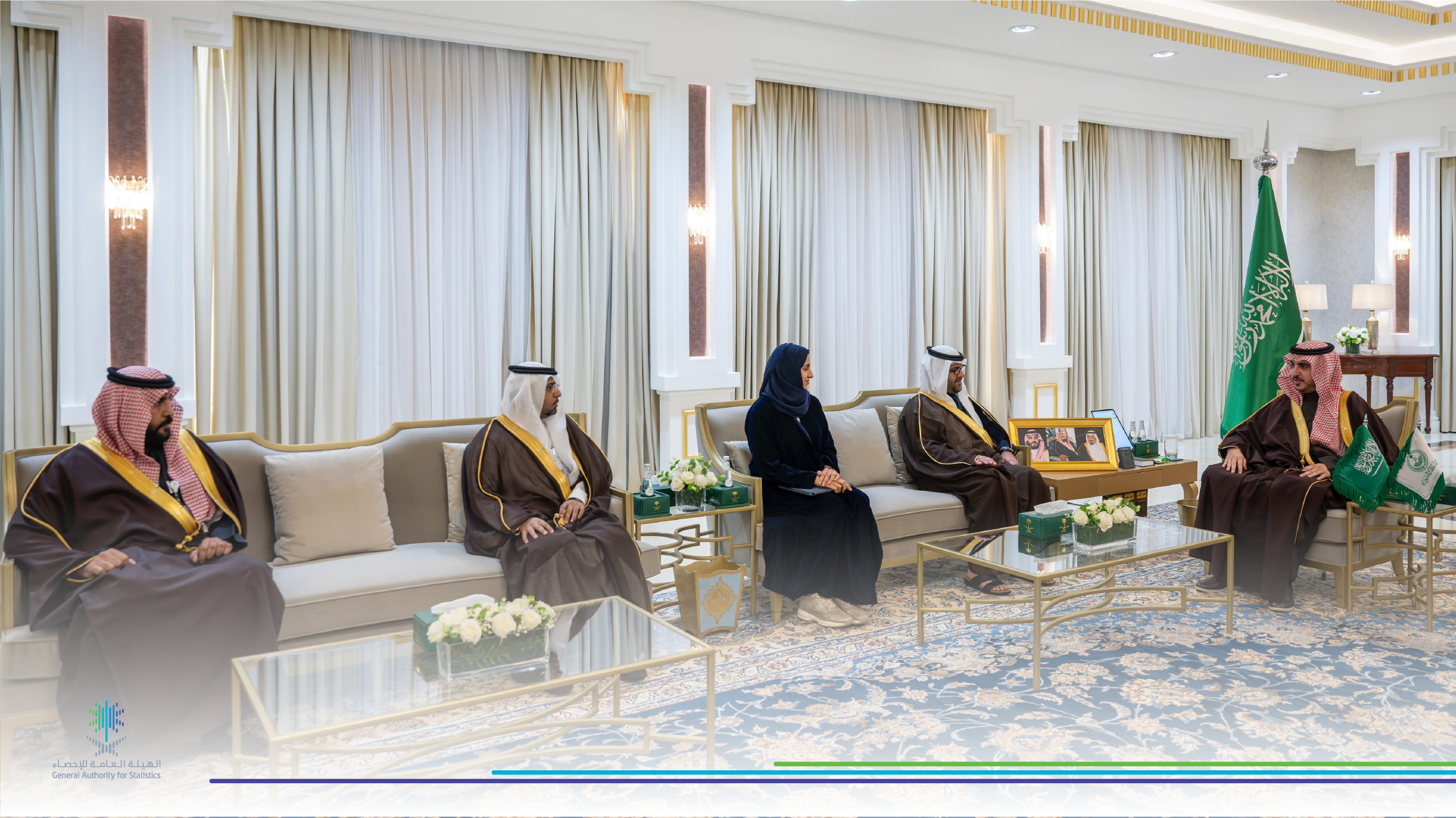
Prince of Al-Jouf region receives GASTAT president
Today, His Royal Highness Prince Faisal bin Nawaf bin Abdulaziz, Prince of Al-Jouf Region, received in his office Dr. Fahad bin Abdullah Al-Dossari, President of the General Authority for Statistics, along with several staff members, and GASTAT’s branch director in the region, Engineer Jarallah Al-Shamrookhi.
During the reception, His Royal Highness was briefed on the works and efforts of GASTAT in providing population and housing statistics at the Kingdom level, specifically concerning Al-Jouf region, its provinces, and affiliated centers.
He also listened to an explanation about the role of GASTAT in providing statistical data to support the development of the region, emphasizing the importance of its role and the information it provides to contribute to the development of all regions.
His Royal Highness, the Prince of Al-Jouf, highlighted the wise leadership's interest in developing and enhancing the regions, praising the role of GASTAT in providing data and indicators that assist in making future decisions and directions for urban, population, and economic development, achieving goodness and prosperity for the country and its citizens.
Dr. Fahad Al-Dossari expressed his gratitude and appreciation to His Royal Highness the Prince of Al-Jouf for his constant attention and continuous follow-up to GASTAT’s work in the region and his support for the branch's activities.
GASTAT Participates in First Conference of Saudi Association for Statistical Sciences
Dr. Fahad bin Abdullah Aldossari, the President of the General Authority for Statistics, participated in the opening of the First Conference of the Saudi Association for Statistical Sciences, which was held in Madinah on Sunday, 11 February 2024, under the theme "Statistics and Health." The conference aimed to discuss the latest developments in the field of statistical data and enhance the desired integration with health authorities in issuing health and social indicators and data that contribute to supporting policymakers and decision-makers.
In his speech at the conference, Dr. Aldossari expressed his sincere thanks and appreciation to the Saudi Association for Statistical Sciences and the Saudi Society for Medical Education for their excellent organization and reception, while also commending the efforts made to ensure the success of the conference.
Dr. Aldossari stated, "For the first time, the General Authority for Statistics (GASTAT) issued six specialized health statistical products at the end of 2023, comprising more than 98 health indicators. GASTAT is keen to adopt a unified working methodology that aligns with the nature of each statistical product, by relying on the Statistical Business Procedures Manual, which is in line with the standards and procedures adopted by international statistical organizations and agencies."
He further explained that the role of GASTAT lies in conducting several specialized health surveys, including the Health Condition Survey, Women's Health and Reproductive Care Survey, Health Determinants Survey, and Health Care Survey. He emphasized that GASTAT collected comprehensive and accurate data from all regions of the Kingdom, following an approved methodology for each survey, and applied best practices, methods, and quality models in data collection and analysis to produce the required health statistical publications and indicators.
GASTAT’s President affirmed that the Authority is committed, within its strategy, to developing its statistical products in general, and health products in particular, in order to provide high-quality health data and indicators that can be relied upon to support all efforts aimed at developing healthcare services. This support aligns with the Sustainable Development Plans in the healthcare sector in the Kingdom and meets international health requirements that contribute to enhancing the Kingdom's international ranking.
It is worth mentioning that the First Conference of the Saudi Association for Statistical Science is sponsored by the Prince Sultan Military Medical City and is held for the first time over a period of 3 days, from 11 February to 13 February 2024. The conference includes several main sessions and workshops on analyzing health insurance data, statistical analysis of medical data using the (R) program, advanced data analysis using the (MS Excel) program, as well as the presentation of scientific medical statistical posters by a group of specialists and speakers, with more than 24 scientific posters and 300 participants.
Appointment of Ms. Sara Alsuhaimi and Renewal of Mr. David Kalisch Membership in GASTAT Board of Directors
The Council of Ministers, in its session held yesterday, Tuesday, 6 February 2024, in Riyadh, issued a resolution appointing Ms. Sara Alsuhaimi as a member, and renewing the membership of Mr. David Kalisch in GASTAT’s board of directors as specialists in the field of GASTAT's work, for a period of three years.
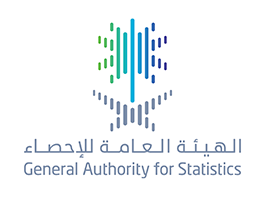
GASTAT issues FDI index for 2022 and for Q3 of 2023
The General Authority for Statistics GASTAT has released the annual statistics publication of foreign direct investment FDI for the year 2022 and for Q3 of 2023 in Saudi Arabia. This is the first time GASTAT has announced these indicators after adopting its calculation methodology in October of last year.
According to the publication's results, the total balance of FDI in Saudi Arabia reached 762 billion SAR at the end of 2022. The total inflows of FDI in Saudi Arabia amounted to 123 billion SAR, while the total outflows reached 17 billion SAR. The net inflows of FDI in Saudi Arabia amounted to 105 billion SAR.
In the same context, GASTAT published the statistics of FDI for Q3 of 2023, indicating that the total inflows of FDI in Saudi Arabia amounted to 17 billion SAR. The total outflows of FDI in Saudi Arabia reached 5 billion SAR, while the net inflows of FDI in Saudi Arabia amounted to 11 billion SAR.
On this occasion, Dr. Fahad bin Abdullah Aldossari, the President of the General Authority for Statistics, affirmed that Saudi Arabia's announcement of FDI for the first time adds a new global standard to improve the quality and transparency of the methodology for calculating FDI statistics. This is achieved by providing globally leading levels of transparency and governance.
He also highlighted the joint efforts with the International Monetary Fund in this project and the integration of roles between the Central Bank and the Ministry of Investment to reach the methodology adopted by GASTAT for calculating the index. He explained that it will enable investors to make investment decisions based on reliable results that support decision-makers and policymakers, and to design investment policies that attract more foreign investments and inform investors about the best investment opportunities in Saudi Arabia.
It is worth mentioning that the new methodology was adopted after alignment with the International Monetary Fund in the new methodology and the confirmation of the United Nations Conference on Trade and Development (UNCTAD) to apply the best practices and international standards according to the International Monetary Fund's Balance of Payments Manual. In addition, the World Bank supported the recommendations presented by the International Monetary Fund in its recent report on Saudi Arabia, which form the basis of the new methodology.
The new methodology will contribute to enhancing governance levels and improving the quality of transparency in the statistical data and information for calculating direct foreign investment indicators as an investment destination in Saudi Arabia.
FDI Index includes about 19 new indicators as part of the new methodology approved by the International Monetary Fund, including the balance and inflows of direct foreign investment by economic activity, investing countries, and regions of Saudi Arabia for the period from 2007 to 2022.
